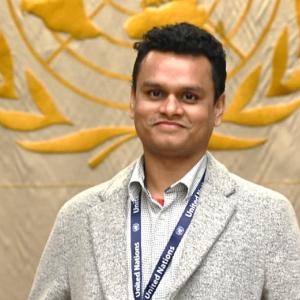Climate change threatens peoples’ right to development by destroying livelihoods, curtailing access to food and energy sources and diverting key resources from the global fight against poverty, a United Nations human rights expert has warned.
Surya Deva, the UN’s Special Rapporteur on the Right to Development, told an audience in New Delhi this week that it was “inevitable” that climate change was already impacting the right to development across the world.
“We need a shift. We need a transformation,” Mr. Deva said as he called for a model of “planet-centered participatory” development.
"First of all, we need a new model of development. Secondly, we need to move towards sustainable consumption and lifestyles. Thirdly, we need to move towards a just transition. And fourthly, we need cooperation: North-South, South-South, international cooperation, cooperation amongst individuals, as well as, of course, among UN agencies."
Mr. Deva delivered a lecture titled “Right to Development and Climate Change: The Way Forward” and held an interactive dialogue with the audience at the India International Centre, which co-organized the event alongside the UN in India.
During the lecture Mr. Deva also called for green technologies to be more widely shared so that everyone can benefit from them. He noted that climate change often caused the greatest impact on those people and countries who were least responsible for it.
Mr. Deva, who has been visiting India in a personal capacity, was appointed UN Special Rapporteur by the Human Rights Council in April 2023. He works as a Professor at the Macquarie Law School, Macquarie University, Sydney.
He said that one of his goals was to "build bridges between the global North and global South because the right to development is a human right relevant not merely for people in India or developing countries as such. It is a right relevant for each and every human being everywhere."
Special Rapporteurs are independent experts that examine either country-specific situations or thematic issues around the world. They serve in an individual capacity and do not receive a salary for their work.












